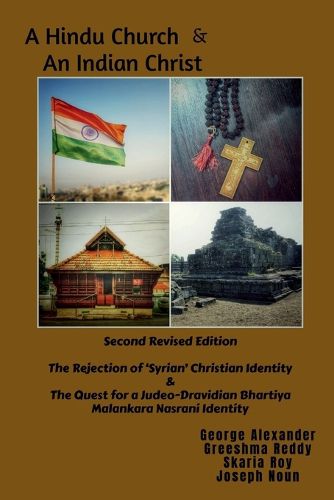Readings Newsletter
Become a Readings Member to make your shopping experience even easier.
Sign in or sign up for free!
You’re not far away from qualifying for FREE standard shipping within Australia
You’ve qualified for FREE standard shipping within Australia
The cart is loading…






This title is printed to order. This book may have been self-published. If so, we cannot guarantee the quality of the content. In the main most books will have gone through the editing process however some may not. We therefore suggest that you be aware of this before ordering this book. If in doubt check either the author or publisher’s details as we are unable to accept any returns unless they are faulty. Please contact us if you have any questions.
This book comprises reflections on the indigenous Malankara Church and its faithful, the Hindu Nasranis, a caste-based community in India. The book discusses the identity crisis encountered by the present-day Nasranis, and how they are bound to carry the 'Syrian' tagline, a foreign identity over their shoulders. It is categorically stated that Malankara Nasranis of India are not 'Syrian Christians' rather they are wrongly addressed in that way. Most importantly the book depicts the cultural, religious and social relations between Nasranis and Hindus and explains how they are different from the rest of the Christians. The book also reminds us that Malankara Church is not a by-product of European missionary evangelism, but a socio-religious institution that originated in India. It emphasizes the importance of the Judeo-Dravidian and Bhartiya identity of Malankara Nasrani which has been overlooked as a result of foreign influences. This thesis also showcases local age-old Nasrani cultural practices, traditions and the changes that took place over the centuries as a result of colonial Christian domination. It calls on everyone to have a better and wider understanding of the Malankara Church, which is a native community of India and not to confuse it as a mere 'Christian Sect'. The book also debates contemporary socio-political and religious scenarios and boldly exposes various issues about the Malankara Church leadership.
$9.00 standard shipping within Australia
FREE standard shipping within Australia for orders over $100.00
Express & International shipping calculated at checkout
This title is printed to order. This book may have been self-published. If so, we cannot guarantee the quality of the content. In the main most books will have gone through the editing process however some may not. We therefore suggest that you be aware of this before ordering this book. If in doubt check either the author or publisher’s details as we are unable to accept any returns unless they are faulty. Please contact us if you have any questions.
This book comprises reflections on the indigenous Malankara Church and its faithful, the Hindu Nasranis, a caste-based community in India. The book discusses the identity crisis encountered by the present-day Nasranis, and how they are bound to carry the 'Syrian' tagline, a foreign identity over their shoulders. It is categorically stated that Malankara Nasranis of India are not 'Syrian Christians' rather they are wrongly addressed in that way. Most importantly the book depicts the cultural, religious and social relations between Nasranis and Hindus and explains how they are different from the rest of the Christians. The book also reminds us that Malankara Church is not a by-product of European missionary evangelism, but a socio-religious institution that originated in India. It emphasizes the importance of the Judeo-Dravidian and Bhartiya identity of Malankara Nasrani which has been overlooked as a result of foreign influences. This thesis also showcases local age-old Nasrani cultural practices, traditions and the changes that took place over the centuries as a result of colonial Christian domination. It calls on everyone to have a better and wider understanding of the Malankara Church, which is a native community of India and not to confuse it as a mere 'Christian Sect'. The book also debates contemporary socio-political and religious scenarios and boldly exposes various issues about the Malankara Church leadership.